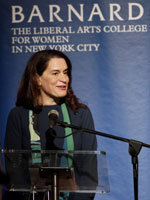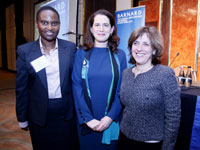Internationally recognised as Women's History Month, March 2011 has seen South Africa benefit from top international and local speakers at women's events in Johannesburg. Celebrating International Women's Day, the WIF conference heard from Dona Oosthuyse, MD: GM for Citi South Africa and the British High Commissioner, Dr Nicola Brewer.
This week saw the release of the first Women Leadership in Africa Pilot Study by the International Women's Forum South Africa (IWFSA) and Barnard College present its annual global symposium for the first time in Africa.
Leadership study begins groundwork
The pilot study on Women Leaders in Africa is a contribution of IWFSA and the United Nations Development Programme (UNDEP) to the promotion of women leaders in Africa and the world, researched by the Da Vinci Group and Frontier Advisory, with input from the Development Bank of South Africa.
The idea was born from the success of the annual South African Women in Leadership census and, funded by Absa, the study was conducted in Ghana, Kenya, Namibia, Nigeria and Uganda. Offering a range of differences, with independence dates ranging over 30 years, population from 2.2 million to 154.7 million and diverse GDPs and economic structures, the commonality was the use of English as a business language, making telephonic research easier.
Hannah Edinger, head of research at Frontier Advisory, spoke of the difficulties of the research at the launch held yesterday, 15 March 2011 at the JSE. "The results we have, though useful in providing a baseline, are not conclusive as there were six main challenges with the survey - budget limitations for on-the-ground research, communication of concepts in English, accessibility of organisations to complete surveys, unwillingness or reluctance to disclose gender or other information to South African-based organisations and misunderstanding of the nature of the research.
"Despite this, the survey was able to establish the participation of women across the eight sectors of agriculture, financial services, NGOs, services, power, government, consumer goods and other. On average, 47.1% of the workforce is female, 38.3% of the management team consist of women but women only comprise 26.8% of executive leadership."
Namibia scores highest
Namibia, with the highest GDP of the five countries (US$4161), indicates the greatest level of representivity at all levels, higher than South Africa with 60.1% female employees (44.6% in SA), 51.9% as managers (19.3%) and 32.2% at director level (16.6%).
In addition to the distribution of women in African organisations, a secondary purpose was to investigate the presence or lack of women empowerment policies in African organisations. Namibia and Nigeria, the two countries with the highest rates of female employment, are also home to the organisations that employ active pro-women employment policies.
The report is available from Frontier Advisory; email moc.yrosivdareitnorf@regnideh.
Women changing Africa
The Barnard College of Columbia University annual global symposia series was launched in March 2009 to provide an annual forum for the discussion of women's issues in regions where such opportunities do not readily exist; create a network of women leaders around the world; inspire young women to reach their own leadership potential; and share these experiences with its students in the university.
In 2009, the symposium was in China, 2010 in Dubai and yesterday, 15 March 2011, it came to Africa at the Sandton Sun in Johannesburg. In South Africa, it was sponsored by ABSA Wealth and Capital and Barclays Wealth and Capital, patron sponsor Jennifer Oppenheimer and supported by Dr Andile Ngcaba, executive chairman of Dimension Data Middle East and Africa.
The networking lunch and afternoon featured Maria Ramos as the opening speaker, a panel on Conversations on Leadership with Ferial Haffajee, editor-in-chief, City Press; Aloisea Inyumba, Senator Parliament of Rwanda; Gill Marcus, governor, South African Reserve bank, Yvonne Mokgoro, chair of the South African Law (Reform) Commission; and Mamphela Ramphele, academic, activist and former senior director of the World Bank, sharing their personal beliefs and visions on their road to leadership.
The second panel, Voices of the Next Generation, had Fiona Budd, non-executive director of the South African Ballet Theatre; Nomfanelo Magwentshu, group integration executive at ABSA and former chief operations officer 2010 FIFA World Cup; Susan Mboya, executive Coca-Cola and founder of Zawadi Africa Educational Fund; and Ndidi Nwuneli, founder of LEAP Africa.
Leadership - a personal, political issue - Gill Marcus
Marcus received an ovation for her remarks on the nature of leadership and the challenge facing women in South Africa. "Leadership is bestowed on you by others, not sought, in fact one should be wary of those who seek leadership positions. It is both a personal issue and a positional issue - as a leader in position of office, one is only a temporary occupant charged to do well in that position, not use it for power. Our biggest challenge is to go back to basics and re-establish our values."
Ramphele also inspired the audience with her call for South African women to take a stand on political and power abuses both in South Africa and Africa. "It was a struggle of ideas, now it's a struggle for the freedom of alignment of personal, professional and political values. The freedom fighters of yesterday are now aging tyrants and the continent is dying for leadership. It is now time for women to fight to build values and instil responsibility in the coming generations. It is sometimes easier to be against something than to be for something but the responsibility lies with us to solve society's problems."
Debora Spar, president of Barnard College, who chaired the symposium, congratulated all the speakers and noted that in Africa, women tell their stories as a way of expressing deep truths about society and its problems rather than just as a life story of success.
For more information on the conference, go to www.barnard.edu/global/symposia/women-changing-africa.
Women stand up and are recognised
At the two-day conference, Women, Stand Up & Be Recognised, key note speakers included Venete Klein, former group executive of Absa and now a management consultant; Chris Kennedy of Phenomenal Women; Samantha Burns, founder and MD of Customer-Mind; Donna Oosthuyse and Angela Peacock, chair of UK group, People Development Team, all of whom spoke of the challenges and personal solutions to balance life, work and spirit as women leaders.
Other workshops strengthened these themes as laughter coach, Shareen Richter; flower therapy coach, Jill Manson; Refirement expert Lynda Smith; fashion advisor, Tracy Gold; and entrepreneur facilitator Rachel Van Doorene, added to delegate's experiences.
A panel of Teryl Schroenn, MD Accsys Payroll; actor and writer, Barbara-Anne Puren; and Connie Mashaba, MD of Black Like Me, chaired by Tové Kane, discussed their challenges and insights in leadership as women. The conference was chaired by Gwen Watkins.





























